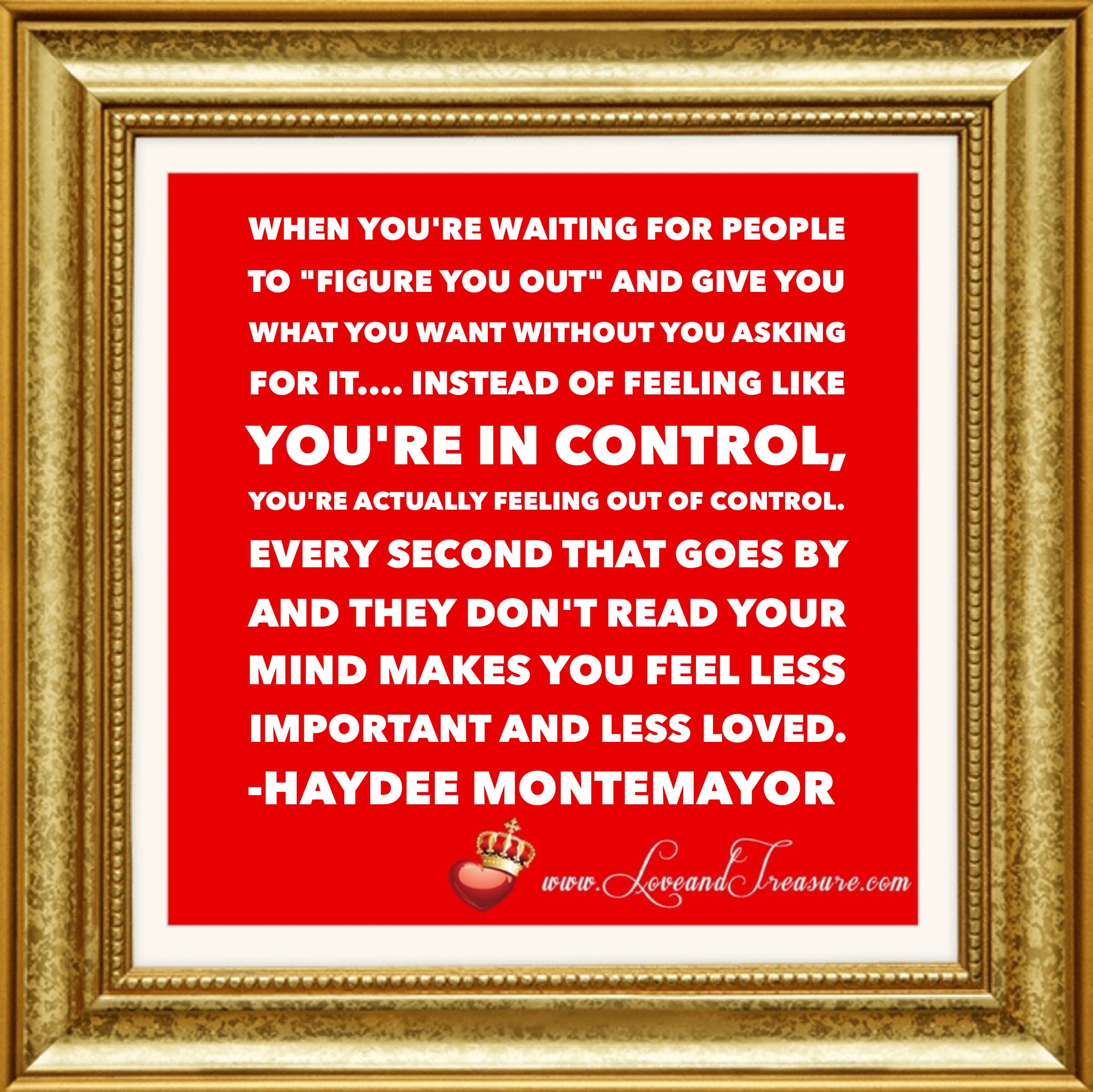So, here are my best tips for how to increase the chances of getting what you want.
The only prerequisite is that you are open to changing the way that you think.
Can you do that? Good. Let’s Get Started!
Hey, Guess What? You DO Have a Genie!
This genie, however, has ONE rule: Be specific in how you feel, be specific in what you want, and be specific in how you ask for it without treating the other person poorly.
- Pretend that the person you want to get something from is your genie.
- But remember, as you know, with genies, you have to be careful how you phrase something because making a vague request gets a vague response. (And it ruins a wish) People don’t usually limit you to 3 wishes, but you can’t keep asking them for tons of stuff forever, you know?
For example, instead of saying:
“You should be able to know what I want when I get all emotional like this!” say,
“I just want you to give me a bear hug and tell me that everything will be okay.”
- Express gratitude for getting what you want. When you get the goods, don’t forget to say “thank you.”
- Feel how wonderful and EASSSSY it is to get what you want when you’re clear.
In the example above, can you notice the difference?
You get what you want ASAP (the bear hug and reassurance) and the other person doesn’t have to think about what you want, they just bibidi-bobidi-boom give it to you. It’s definitely a win-win-for you both.
- You can’t control their mind, you can’t control their heart and you can’t control their beliefs. So instead of waiting for them to have compassion, to offer to help you or to think the same way that you do, ask clearly for what you want. They’re a genie, not a mind reader. You still gotta do the ask.
- This genie “of yours” is genie to a lot of people as well, so your wishes will not always immediately be their command. Be patient. Wait your turn.
- Even genies have wishes. And they have a heart, needs, and dreams and they need a hand from time to time. So help them out. If you treat a genie kindly, they will be kind to you.
Be Okay With “No”
In life, you win some and you lose some, but in order to be in the game, you’ve gotta realize that sometimes, when you ask for things you want and you need the answer will be, “No.”
And that’s okay. Beautiful even, because that means that when someone asks YOU something, that YOU have the same right to play by the same rules and say “No,” to them, not out of spite, but because you want to honor what you desire and WHAT YOU DON’T desire… what you want and WHAT YOU DON’T want.
There’s nothing worse that agreeing to say something that you DON’T want to do and want to kick yourself in the butt for it.
Notice What Actually Makes You Feel More Comfortable and More In Control
“When you’re waiting for people to “figure you out” and give you what you want without you asking for it…. instead of feeling like you’re in control, you’re actually feeling out of control. Every second that goes by and they don’t read your mind makes you feel less important and less loved.” – Haydee Montemayor
But what if you told the person what you wanted?
A) You would stop waiting
B) You would be doing something about it
C) They could say “yes”
D) They could give you what you wanted
E) They could say “no” and you could then move on to Plan B
Doesn’t that feel like being more in control than expecting to be surrounded by mindreaders?
Yep, I thought so.
And, the more you get into the habit of asking people for what you want, the more comfortable you’ll feel. Even if they say “no,”…. because at least you’ll get that “no” out of the way.
Plus, even if they say “no” for one thing it doesn’t mean that they’ll always say “no” for everything and forever. So, it boils down to trying.
And trying. And trying, and hopefully getting more self-sufficient in the process.
What To Do When People “Fail You” (AKA Don’t Give You What You Want and Need)
- (Mmmmmhhhha) This is literally, vital… but hard… especially when you’re upset that the answer the someone gave you was not the answer you were expecting. In that case, breathe deeper and really let it all out. (Mmmmmmm Ahhhhhhhh)
- Rephrase your emotions into language that they can understand and NOT get all defensive about. In order for them not to get defensive, you need to use language that doesn’t attack or that doesn’t convey that you’re pointing fingers. The rule of thumb is to stick to how you’re feeling instead of trying to imply that what the other person “did” to you made you feel a certain way.
- As much as possible, stick with the facts. Men react more positively to facts than they do to emotions. Instead of putting on a pouty face and saying “You were late to my sister’s wedding because you don’t care about my family or me.” (Does that remind you of Married At First Sight, by chance? 😉 It was actually one of my favorites for April)… say… “You got to the wedding premises at 6:45 P.M., when the wedding actually starts at 7:00 P.M. and you’re gonna officiate the wedding.”
- State what you expect for next time. Listen up ladies: guys don’t tend to like this tip because it makes it harder for them to get off the hook when something similar happens in the future, but stick to this anyway. ? Whenever you have an argument or a misunderstanding, say something to the effect of, “Okay, don’t worry about it. Let’s drop it. But can you promise me that next time that ____ happens, that you’ll ____?” They’ll usually say “yes.” However, the question is whether they’ll actually carry through the next time when it happens. From experience, they’re bound to “forget.” But don’t lose your cool (although I know you’ll want to), simply say, “Remember when something like this happened about one ______ minute, day, week, month or year ago? And yep, ladies can remember things that happened YEARS in the past, #amiright? If the guy says that they do remember, “Oh my! You’re in luck!” But if they say that they don’t remember, briefly remind them. If they’re still claiming amnesia, just continue with your original plan. State what you would expect for next time. And if they claim amnesia for the 2nd time for the same thing… I would start recording conversations (arguments, specifically). Us ladies don’t have time for this mental runaround. You may think that recording arguments is creepy. I call it smart. Not only will you really e able to review what they said, but hearing yourself argue can allow you to see in what way your communication can improve. And if the same situations pops up again, no worries, the proof will be in the pudding, my friend. Ta-da!
- Call your emotions by their name. If you feel insecure, scared, etc. say so. For ideas of what words to use look into a prior post, How Good Of A Communicator Are You, Really?You gotta name it to claim it, get the reassurance/clarity you need and then release it. IFFF someone asks you, “What’s wrong?” don’t resort to the totally-lying-between-your-teeth-and-you-know-it, “Noooothing.”
- Recognize when you’re trying to “take it out” emotionally on someone. Notice when you’re prone to letting off steam. Notice when you’re directing your frustration at someone. Most importantly figure out WHY you’re doing this and what advantage that’s giving you. In other words, what are you getting out of not getting your needs met? Realize that it’s not fair to be unfair and to blame others for issues that are going on inside of you and emotions that you’re supposed to be able to process without necessarily putting the blame on other people, especially those that have nothing to do with what you’re experiencing. Oh, and by the way, when you catch yourself doing this, this is the BIGGEST clue that you have to speak up, acknowledge the truth and get rid of the shitty feeling. Throw the poo down the drain, not at someone else. P.S. Stuffing yourself with a pint of Talenti gelato isn’t the answer either.
- Notice if the reason you’re getting upset at someone failing to please you is because you feel nervous, scared or out of control. Have compassion for yourself and for the other person. Empathy. Heart. “Don’t let the conditions of the difficult moment you’re living become a difficult moment between you.”
- Get to the root of the issue. If you’re upset that your husband wasn’t gonna get to your sister’s wedding on time, really dig deep and identify what it is about this situation that is making you feel out of balance. If, for example, you felt nervous thinking that your husband wasn’t going to make it to your sister’s wedding, that the wedding would start late because of your husband or that perhaps something had happened to him on the way there, tell him that instead of going on and on and give him the “How could he?” speech for days.
What Not To Do When People “Fail You”
- Don’t name call. Don’t call someone inconsiderate, lazy, unloving or worse. Got it? Good?
- Don’t project what they did wrong this time into the future. Don’t say, “Based on how you reacted with this request, I wouldn’t doubt that you won’t be able to do ____, when the day comes / when I need you/ during Christmastime.”
- Leave the “I can’t believe” comments for another time. Hopefully for a good surprise. So instead of saying, “I can’t believe you did _____” or “I can’t believe you were ___” or “I can’t believe you didn’t ____” or “I can’t believe you weren’t _____,” (you get the point), get into the habit of using that phrase for positive things, “I can’t believe you took the time to make me my favorite cookies even though you got home tired from work. How thoughtful! Thank you!” You see what that does? If you do that often enough, you’ll be encouraging positive behavior with that phrase instead of adding salt to a wound or unwanted honey to an already sticky situation. When you use this phrase negatively you usually do three things:
- make the other person feel worse,
- make yourself feel worse,
- and make the situation worse because you’re essentially adding shame to a wrongdoing… so you create an additional problem to resolve.
- Don’t blame people for things that they couldn’t resolve even if they wanted to. Don’t say “I felt neglected by you.” What if they weren’t by you because they needed to run to the restroom? Were they supposed to not go to the restroom so that you didn’t feel unwanted? How could they have predicted that whatever the action was that they were going to take was going to make you feel unwanted? Most likely, they couldn’t right? Plus, what do you say to someone who felt neglected? What do you do? You can’t turn back the time.
- Don’t generalize. Don’t say things like “You never help me.” “You’re always gone.” “You’re never here when I need you.” “You always do that.” “You never do that.”
- Why shouldn’t you say that? For three reasons: a) Saying that, no matter how true it feels, is most likely a lie (Why? Cuz there are hardly any absolutes in life. Absolutes are true when you say you’ve never done something in the past. For example, you can say, I’ve never been to Montana, and that would be true). 2) You will make the other person feel worse than they do… and they can become sadder, more ashamed or angrier 3) Saying an absolute that’s not true will become like a self-fulfilling prophecy that you’ll attract. And since the other person doesn’t believe in them anyway, they’ll be less worried about disappointing you. They’ll do what you hate almost on purpose (although subconsciously) so that in the future you can say, YOU SEE?! You’re never here when I need you.”
- Don’t assume that people know what you want and don’t expect them to. Even genies need to know what you want to fulfill your wishes, remember?
- Don’t try to take them down emotionally. Don’t say things like “If you were a good husband, you would ______.” #badidea
- Don’t put the entire responsibility of Maslow’s Hierarchy of Needs on one person. (In other words, remember that there are no Prince Charmings For example, don’t say, “I need you to make me feel safe.” “I need you to make me feel loved.” “I need you to give me support so that I can become self-actualized.” These requests are SOOOO BIIIGGIG that the other person will be left wondering where to start, so much that they’re very likely to not start at all. Plus, even if someone is amazing with you, they will not last forever. None of us will.
In Sum, What Should You Do?
Express your needs honestly and politely in a clear way and invite other people in your life to do the same. That will increase the odds of you getting what you want and will allow you to give others what they want.
As others communicate their needs with you, you get to practice recognizing what clear requests sound like so that you can be clearer with them, too. In the end, everybody can win, as long as they continue to communicate.
When It Comes To Communication, Give It To Them Straight
Instead of focusing on all the “he said/she said” that may be going on in any relationship in your life romantically and otherwise, you gotta remember one thing that we spoke about in the prior post Fess Up, What Are You Getting out of NOT Getting What You Want? : Don’t send mixed messages.
So, Let’s Wrap It Up, Shall We?
To wrap up all of this communication series (you can find all of the links for it below), any time you feel that you’re upset because someone is not giving you what you want or need and instead is giving you what you don’t need, ask yourself these questions:
- What is happening that is causing these emotions to surface?
- What emotions are popping up?
- What am I needing that I’m not getting?
- What am I getting out of not having my needs fulfilled? What am I getting out of NOT getting what I want?
Only by thinking about these questions and coming up with honest answers and helpful solutions can you actually increase your odds of getting what you want and what you need.
Continue on and ask yourself:
- What do I really, REALLY want?
Be okay with owning what you want and what you need and proclaiming it.
- What am I truly asking for?
Say what you mean and mean what you say. Make sure that your actual desires are matching up to your nonverbal cues and body language.
Whatever You Do, Keep This In Mind
- Life is much more fun when you have what you want and you have what you need.
- Don’t pretend that you don’t want and need what you do.
- Speak up for yourself.
- Be your best advocate.
- And PLLLLEASE, don’t get to the end of your life without fully embracing your desires.
Your desires are what make you feel alive.
Let me repeat that, it’s THAT important:
Your desires are what make you feel alive.
They’re what make this thing called life worth it.
As long as what you want, what you need, what you say you want, what you actually want, your tone, and your body language are all matching, and your intention in getting what you want is clear, but also generous with others… then you should be golden… and your life should be golden.
A Controversial Caveat
The older I grow, the more I believe that there are two main wills in life.
Your will.
Life’s will.
One is not better than the other.
“Life is a sensual dance between your will and life’s will.”-Haydee Montemayor
And if you don’t get what you want or need it’s usually for one of five reasons (you can read about additional reasons in the prior post):
1) Life will gift you something better.
2) There’s a lesson, a blessing a gem in what you perceive to be the absence of what you want. It’s always there. Always. And it can be more than one.
3) What you want is on its way and just a little bit more patience will be key.
4) You have to work harder for what you want.
5) You have to change directions and go after a dream that will ultimately end up being much more satisfactory than the one that you want.
“What you have been able to attain and what has been denied to you PLUS what you’ve been able to choose and reject are all events that you’ll one day be able to connect the dots with and see how they formed the tapestry of your life.
“Focus on what you have because what you have is what you once wanted, and what many would give the world for.” -Haydee Montemayor
Now It’s Your Turn
- Which of the “no-no’s” for communicating your needs are you guilty of?
- Which of these tips has worked well for you?
- Which of the ways of better communicating your needs will you be trying first? Why?
- Do you have any tips that have worked wonders for you?
Share your experience with us. After all, you can be our knowledge genie. 😉
The Want/ Need Series
If you liked this post, feel free to visit the others in the series designed to teach you how to navigate the difficult waters of assuming responsibility for what you want, what you need and how to communicate those wants and needs.
- What Do You Mean Don’t Take Anything Personally?
- How Good Of A Communicator Are You Really?
- How Do We Get In The Way Of What We Want? And What To Do About It
- What Do You Need That You’re Not Getting? – And What To Do About It
- Fess Up, What Are You Getting Out Of NOT Getting What You Want?
- How To Increase The Chances Of Getting What You Want?







